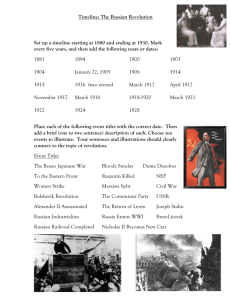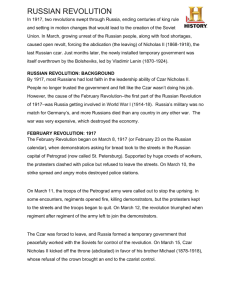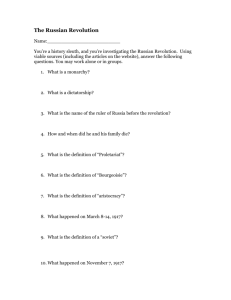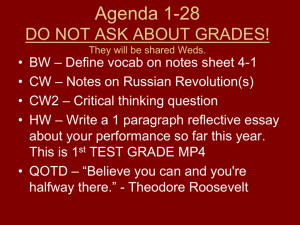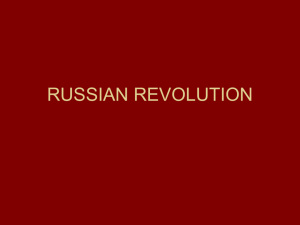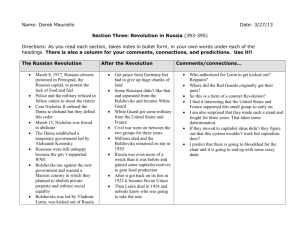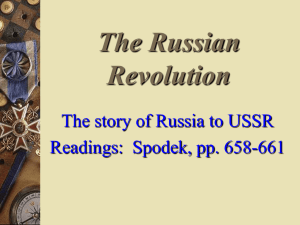RussianRevolutionPart1_2009
advertisement
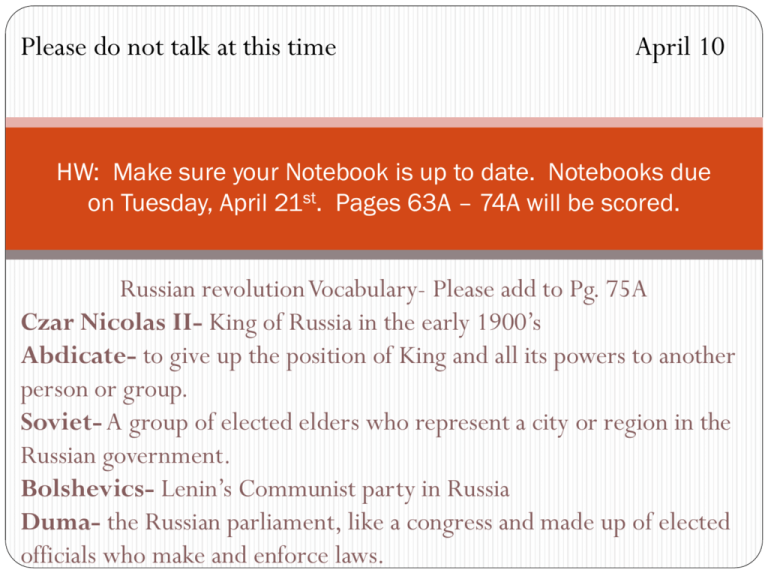
Please do not talk at this time April 10 HW: Make sure your Notebook is up to date. Notebooks due on Tuesday, April 21st. Pages 63A – 74A will be scored. Russian revolution Vocabulary- Please add to Pg. 75A Czar Nicolas II- King of Russia in the early 1900’s Abdicate- to give up the position of King and all its powers to another person or group. Soviet- A group of elected elders who represent a city or region in the Russian government. Bolshevics- Lenin’s Communist party in Russia Duma- the Russian parliament, like a congress and made up of elected officials who make and enforce laws. Presentations: We will now see the last of the WWI presentations. Please get your student review sheet from the front table. Video on the Fall of the Czar and the Russian Revolution- Part 1 Consider these questions as you watch the video: What are the peasants upset about in the winter of 1917? How do the Russian Soldiers respond to their orders to attack the demonstrating peasants? How does Czar Nicolas II respond to the demands of his people? Why is this such a mistake? What is the result of the Czar’s actions? Please do not talk at this time April 20 HW: Finish your Russian Revolution Timeline Notebook Due tomorrow, pgs. 63 - 74 I was sick for the WHOLE break. Nothing has been graded. Please be patient. STAR Testing this week- Why STAR Testing Counts Help Ms. Caramagno Out: I need examples of Student work for two assignments: The comparison of South American Countries from our unit on Revolutions of South America and our Comparison on African and European Culture from the Imperialism unit. I’ll give extra credit to any student’s work I accept as an example for this teacher project. Last presenters? Video on the Fall of the Czar and the Russian Revolution- Part 2 Consider these questions as you watch the video: What changes take place in Russian society after the abdication of the Czar? What was the purpose of the Soviets? What promises does Lenin make the Russian people? Why are his ideas more appealing than those of the Provisional Government? What is the result of the Czar’s actions? Video on the Fall of the Czar and the Russian Revolution- Part 3 Consider these questions as you watch the video: What is significant about the Bolshevik's refusal to join the Provisional Government? What does General Kornilov do that is such a disaster? How do the Soviets respond to General Kornilov’s actions? How do the Bolsheviks ultimately come to power? Now we will look at the events of the Russian Revolution in more detail. Get a Timeline Assignment paper. Cut out the timeline events. Using your book, your brain, your video notes and your partner, put these events in order on a timeline from 1900 – 1930. Write one sentence defining each event. 1900 Event- Date- Definition Event- Date- Definition Event- Date- Definition Event- Date- Definition Event- Date- Definition Event- Date- Definition Event- Date- Definition 1930 Please do not talk at this time April 20 HW: Finish any work left over from today. 3rd Period WILL be in rm. 203 (right here!) for STAR Testing! Please get your notebooks out and turn them to pg. 63A. Write your name at the top of the page and turn them in to the stage. Please get your Posters or WWI Projects from the front of the room. You need to take them home today. Have your Timelines Ready to go over in class! Timeline Corrections! 1900 1917 Czarist Russia (1800's - 1917) Russian Industrialization (1860's - 1900's) Formation of the Menshevics and Bolshevics (1903) Czar's Secret Police cracks down on radical Bolshevics (early 1900's) Lenin flees to western Europe (early 1900's) Russo-Japanese War (1904) Bloody Sunday (1905) Formation of a Russian Parliament (the Duma) (1906) Russia enters WWI (1914) Rasputin comes to the Palace to "heal" Prince Alexi (1915) Russians suffer massive casualties at the Eastern Front (1914 - 1917) Russian soldiers mutiny, desert and ignore orders (1915 - 1916) The March Revolution (1917) 1917 1930 Czar Nicholas II abdicates (steps down from) the throne of Russia (1917) Kerensky takes power and decides to stay in WWI (1917) Socialists form Soviets (Councils of elders) to protect peasants (1917) Lenin returns to Russia and starts the Bolshevik Revolution (1917) Lenin seizes power in Russia (1917) Russia leaves WWI with the Treaty of Brest Litovsk (1918) Civil War in Russia between the Reds (Communists) and the Whites (Capitalists) (1918 - 1920) Red Army wins the Civil War in Russia (1920) Lenin starts his New Economic Plan (1921) Russia renamed Union of Soviet Socialist Republics (1922) All powers falls into the hands of the Communist Party (1920's) Stalin becomes a dictator (1929) Cause and effect In your pod, identify as many Cause and Effect Relationships that you can in your Timeline. Take your top 2 or 3 and write them into 2 or 3 clear cause and effect statements. Write these on a mini whiteboard to share with the class (make them big and easy to read!) Use Cause and Effect language: First...then… The effect of…was… This…led to… Therefore… This…caused… As a result… This…was a result of… As a consequence… Due to… Was responsible for… Gave rise to… Accounted for… Political, Economic, Social Remember these? What types of events go into each category? Political- Government, wars, laws, police, courts, trials, politics, political parties, parliaments and congresses, etc… Economic- Money, natural resources, infrastructure like roads, power plants, factories, business, economic systems, distribution of wealth, land, resources, etc… Social- People, traditions, ways of doing things, culture, beliefs, religion, social groups and classes, etc… Find your video notes… Look at the back of your video notes… Here are several events that led to the Russian Revolution. Decide what category each one goes in, Political, Economic, or Social. Then complete the question at the bottom… Finish the rest for HW. Please do not talk at this time April 27 Please get your notebook if you have not done so already. Please get out your paper on Factors Leading to Revolution in Russia and your Russian Revolution Timeline. Check your Factors paper: 1. Political 8. Political 2. Social 9. Social 3. Political 10. Political 4. Political 5. Economic 6. Economic 7. Political HW: Finish class work at home. Are your answers different? That could be ok… what is your reasoning? Defend your choice! Share out Suggestions to the Czar… Of all these answers, which one is the MOST likely to be successful and why? Get a 3 Social Revolutions Paper and a Comparison Chart Look carefully at the information on three of the revolutions we have studied so far. What do they have in common? How are they different? Consider these focus questions: What did people want? What prevented them from getting what they wanted? How did they respond to these challenges? Were they successful? What led to their success or failure? Now choose one of the three options on your Comparison Chart Fill out your chart using the handout. Answer the two focus questions on the back in complete sentences. Peace! Land! Bread!
